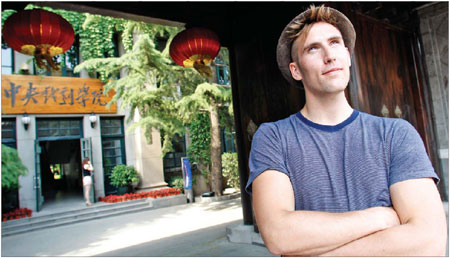Riding on a mystery train
Updated: 2011-06-10 10:32
By Zhang Xi (China Daily European Weekly)

Belgian language student Sid Gulinck is studying to become a playwright, but unlike other young Europeans, he writes his plays in Chinese. Zhang Wei / China Daily
Young gun 2: How Mandarin language opened Sid's mind to a new world perspective
Sid Gulinck enjoys traveling around China, but one of his most interesting adventures was a mystery freight train-hopping journey he made this year.
Together with two friends, he was trekking along the boundary line between Beijing and Hebei province and stumbled on an empty freight train that had stopped in a small station. There were no guards around so they came up with an idea.
"Although we did not know where the train was heading to, we jumped into the box car to start our journey into the unknown," he says.
The train traveled a few hundred kilometers to bordering Shanxi province, and for Gulinck, the special trip helped him understand the uncertainty of life's destiny.
But for Gulinck, who is now studying to become a playwright at one of China's best drama colleges, one fact about his future seems obvious: A life closely entwined with China.
In 2007, when he was a sophomore majoring in Mandarin at a Belgium university he made a decision to go to China to enrich his knowledge of the ancient language.
Lecture rooms and textbooks were a good start, but nothing beats living and learning a language in its native country, he says.
"It was very natural for me to do that since I wanted to see the birthplace of the Chinese language," he says.
Gulinck took refresher courses at Shandong University in Jinan, the capital city of Shandong province and a new life unfolded.
For him, learning Chinese was "preordination", a word he repeated several times in the interview.
"Without any reason I can explain, I was deeply attracted by Asian culture from my childhood," the 23-year-old recalls. "Everything about Japan and China easily gets my attention."
Two years before coming to China, Gulinck enrolled in the Chinese department at Leuven University, with 500 other students, a record number for the school.
"Before and after that year, Leuven had never recruited that many Chinese majors," he says.
"Like many of the other students, I wanted to distinguish myself from those who studied traditional courses. In my country, Chinese is not a popular major so since I am very interested in languages, why not learn one that is unfamiliar to Western people?"
After receiving his bachelor degree, Gulinck participated in Chinese Bridge, an annual Chinese proficiency speaking competition for foreign college students, organized by the Confucius Institute.
In 2010, after many years of study he won a top prize in the contest. He was rewarded with a scholarship from the Chinese government and was assigned to the Central Academy of Drama, because of his passion for this performing art.
He started his refresher courses at the same university, which cultivated world-famous actresses such as Gong Li and Zhang Ziyi.
Although his major is playwriting, he also joined the college drama group in order to enhance his understanding of theater. And of course performing in Chinese helped his language abilities, too. "I learn Chinese because I have the passion, which is the most important part of language learning," he says.
"I used to spend almost all of my leisure time studying Latin, because I loved to learn it. And now, the passion is used on Chinese learning."
He admits his two main difficulties in learning the language are pronunciation and characters, but he has developed his own system to overcome these hurdles.
To improve memory, Gulinck writes each character 100 times and after class asks teachers to correct his pronunciations. "When I hear a local person's pronunciation of a character that is different from mine, I will ask him to teach me until I can handle that," he says.
"If you only consider a new language as a tool to make money and do not have passion about it, you should definitely not learn it."
Because of his love for the language, his typical day starts with reading Chinese books, and then writing Chinese poems and plays. "I do not have the sense of Saturday or Sunday, every day is a working day," he says.
Other than being a student at the university, Gulinck has another identity, an intern at a Chinese cultural exchange company, which arranges performances of overseas acts in China.
"I love the job since it allows me to practice Chinese by translating for foreign performers," he says. "Besides, it also provides me many opportunities to watch live shows."
Gulinck also acts as a bridge between staff of foreign colleges and those from his university. In April, he was an interpreter for teachers and students from Guildhall School of Music and Drama in London, when they came to visit the Central Academy of Drama.
Before the translation work, Gulnick had not been a big fan of music so the experience helped him broaden his outlook on life. He says his broader awareness of the world is just one benefit of living in such an international city as Beijing.
"We should not be confined by stereotypes, and we need to look at what's new in everything," says Gulinck. "This is what I want to tell my fellow Belgians how to view China. People should look for the modern face of China, rather than only considering it an old symbol." But for many Chinese, the same Belgian stereotypes are also hard to shake.
"People here may only know Belgian chocolate, but I often tell my Chinese friends, French fries are not from France, their birthplace is Belgium!" he says.
How does he describe his countrymen to Chinese? "I would use the word 'reserved'. For example, Belgians do not greet strangers on the street. But when you became friends with them, they can be very zealous," he says.
"Belgians are also patriotic but they also like to point out the deficiencies of the government. However, sometimes their patriotism goes a little bit further.
"Many Belgians think our country is the center of Europe and it should get more attention. But I think Belgians should think about the whole picture rather than Belgium only."
In his every day life he is working hard to realize his dream of writing plays and like many expats, is working on a book about his China experience.
"The biggest difficulty for me here is to find a publisher for my book," he says. "But this is only part of my plan. Besides, I hope to learn Chinese literature, simultaneous interpretation and maybe more about tea culture. There is so much to learn here."
He says old city of Beijing is the ideal place to learn new things. He describes his second hometown as an old man, full of vigor, talking about new things with raucous voice.
"I really love the city, and there is certainly a unseen link between us," said Gulinck.
E-paper

Harbin-ger of change
Old industrial center looks to innovation to move up the value chain
Preview of the coming issue
Chemical attraction
The reel Mao
Specials

Vice-President visits Italy
The visit is expected to lend new impetus to Sino-Italian relations.

Birthday a new 'starting point'
China's national English language newspaper aims for a top-notch international all-media group.

Sky is the limit
Chinese tycoon conjures up green dreams in Europe with solar panels
